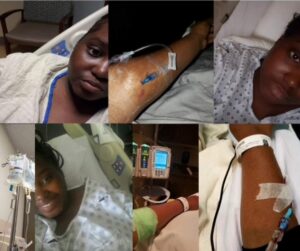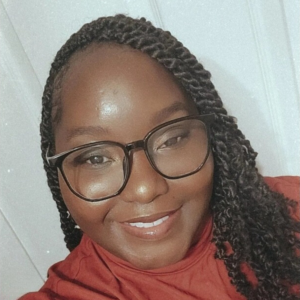Meet Lesley Wilks: Pretty Sick
Lesley Wilks’ journey with autoimmune diseases has not been an easy one. To date, she has been diagnosed with three separate autoimmune diseases – Hidradenitis Suppurativa, Ankylosing Spondylitis, and Crohn’s Disease. With each diagnosis she experienced severe pain, fear, tears, grief, and constantly questioning what her future would look like.
Journey to Diagnoses
As a teenager in the early 2000’s, Lesley was diagnosed with her first autoimmune disease – Hidradenitis Suppurativa (HS), a condition that begins as pimple-like bumps on the skin in areas such as the underarms and the groin. These lumps are painful, heal slowly, recur, and can lead to tunnels under the skin. “As a teen, I would say that recognizing or even understanding how much of an effect this disease would have on my life as I got older really didn’t ring a bell until I was in the thick of it and I didn’t really receive proper treatment for it until recently,” Lesley recounted.
 Her next diagnosis took longer. From the years of 2013-2016, Lesley would experience severe leg paralysis where her legs felt heavy and painful, and she was basically bedridden, unable to walk independently or do anything on her own. She was in and out of hospitals for years, spending long days and nights continuously wondering if she would ever find relief. In 2016, she was finally diagnosed with Ankylosing Spondylitis (AS) after so much testing. AS is a type of arthritis of the spine, causing swelling between vertebrae in the spine as well as the joints between the spine and the pelvis. Over time, it can also cause the vertebrae in your spine to fuse, causing extreme pain, stiffness, deterioration, and further reducing movement.
Her next diagnosis took longer. From the years of 2013-2016, Lesley would experience severe leg paralysis where her legs felt heavy and painful, and she was basically bedridden, unable to walk independently or do anything on her own. She was in and out of hospitals for years, spending long days and nights continuously wondering if she would ever find relief. In 2016, she was finally diagnosed with Ankylosing Spondylitis (AS) after so much testing. AS is a type of arthritis of the spine, causing swelling between vertebrae in the spine as well as the joints between the spine and the pelvis. Over time, it can also cause the vertebrae in your spine to fuse, causing extreme pain, stiffness, deterioration, and further reducing movement.
Not long after her AS diagnosis, Lesley started experiencing severe gastrointestinal symptoms, which she initially shrugged off as a continuation of menstruation pain. However, for several months she continued to experience pain, an inability to hold food down, constant nausea, and continuous bleeding. These symptoms opened up a period of numerous tests, wrong diagnoses, and medications that ultimately did not work until she was finally referred to a gastroenterologist. After undergoing a colonoscopy, Lesley was diagnosed with Crohn’s disease (CD) in 2017. Crohn’s disease is an inflammatory bowel disease characterized by severe and persistent inflammation of the lining if the gastrointestinal (GI) tract causing severe abdominal pain, diarrhea, fatigue, weight loss, and malnutrition.
Biggest Challenges
The lengthy and heart-wrenching journey Lesley has been on really opened her eyes to the struggle of being correctly diagnosed within the medical community. Lesley said, “This really lit a fire within me. I was constantly being told, ‘oh, you might have this, or you might have that’, but the constant battle still didn’t connect me to proper treatments that made a difference in my overall health. I continuously felt frightened and exhausted and worried that it would never get better.”
Lesley shared that her biggest challenge on her autoimmune journey has been feeling as if she lost herself. “There’s a part of being chronically ill that many don’t talk about, that others can’t really see, and that is grief. Grief for what used to be when it comes to our lives. The range of emotions that we often deal with as we learn to live and accept life as it is now, as chronically ill individuals, is tough,” she said.
“Oftentimes I have to sit with my own emotions and thoughts and when I do, I am actually filled with gratitude for being able to function as I do with all the illnesses I live with, for family and friends who do their best to support me, and for my own resilience to push through,” Lesley said. “However, at the same time I am filled with sadness…sadness for past dreams and hopes, how they no longer fit my reality; heartache for what my previous body and features looked like, and the struggle of simply not being able to do things as I once did. To anyone feeling the same way, just know it’s okay to feel all of these emotions… but what we do with our bereavement matters most.”
Adapting to Life with Autoimmune Disease
Lesley shared that there have been a few instrumental things in her life that have helped her to navigate and adapt: research, community, and faith.
Research: The research that is available allowed for Lesley to really dig deep into what it means to have autoimmune diseases. This is how she gained so much knowledge on how autoimmune diseases affect her daily life. Research has helped her to see the hope in medicine as it advances and continues to be innovative especially as a black woman.
 Building Community: As Lesley got adjusted to living life with three autoimmune diseases, she put her energy into creating community. Lesley founded P.S. Pretty Sick, a website and Instagram community, as a safe space for other people living with autoimmune disease and invisible illness to build connections – both in person and social media – and to understand, uplift, and support each other.
Building Community: As Lesley got adjusted to living life with three autoimmune diseases, she put her energy into creating community. Lesley founded P.S. Pretty Sick, a website and Instagram community, as a safe space for other people living with autoimmune disease and invisible illness to build connections – both in person and social media – and to understand, uplift, and support each other.
Regarding the name of the community, Lesley explained, “Shortly after I was diagnosed with Crohn’s disease, someone told me I was too pretty to be this sick. The comment did not sit well with me – why couldn’t I be both pretty and sick? So, I turned it around to empower myself and others in our community. Beauty has nothing to do with illness. You don’t have to look a certain way to be beautiful or pretty. And I never want to exclude anyone just because they have an illness.”
Faith: Lesley’s faith in what God promises and knowing that these things are only temporary has also gotten stronger and it’s a reminder that even in difficult times, there can be something positive or hopeful to be found and to look forward to.
Advice for other Autoimmune Patients
“Never be afraid to advocate for what you need when it comes to your health. Speaking up for yourself will allow others to listen and understand that your health is important to you,” she said. “Don’t be afraid to ask questions or get a second opinion; it’s your body and your personal journey, so if you ever don’t feel comfortable with what one doctor is saying, get a second or third opinion if you’re able to. You’re not committed to one healthcare provider when it comes to your health. Lastly, don’t let your illness stop you from living, traveling, or enjoying the beautiful things in life when you can. When you do, it will allow you to confront grief that you may be dealing with, create rest goals, focus on joy you can control, and simply tap into you and the things you miss doing when down.”
Join our email list
Receive the latest blog articles, news, and more right to your inbox!
Related articles you might be interested in

Finding Purpose on the Trail: A Father’s Journey Through the Shenandoah for His Daughter and the Autoimmune Association

Meet Erika: Battling 6 Autoimmune Diseases—and Advocating for Millions

Art with a Mission: John von Bergen Gives Back to Autoimmune Community Through Sales

Meet Makenzie: A Young Adult with Autoimmune Disease Navigating Life, Uncertainty, and Hope
Find more resources on autoimmunity
Learn more about autoimmunity, diagnosis tips, how to find a physician, and more.